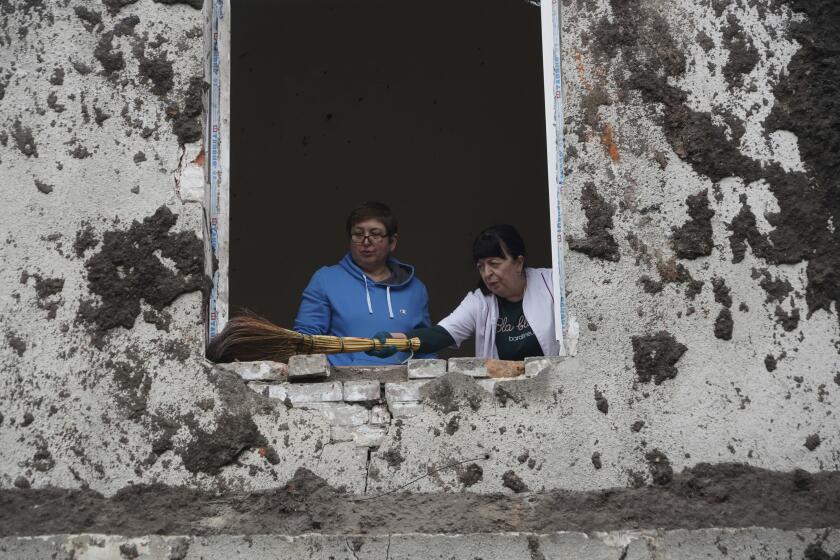NATO Vows to Enforce ‘No-Fly Zone’ in Bosnia
Foreign ministers of the Atlantic Alliance pledged Thursday to use NATO warplanes and other military assets to enforce the U.N. “no-fly zone” in Bosnia-Herzegovina, and they threatened to act if Serb militias interfere with relief activities or attack U.N. peacekeepers.
Hammered out in a closed meeting that ran almost two hours longer than scheduled, the declaration marked NATO’s first commitment to use military force at a time when none of its 16 member states was directly threatened.
The agreement was a compromise between the United States, which favors ever tougher action to end the brutal ethnic warfare over the ruins of Yugoslavia, and Britain, which urges caution.
Secretary of State Lawrence S. Eagleburger conceded that the declaration, which Washington introduced, is “probably not as tough as it started out.” But he insisted that it is “totally satisfactory.”
The North Atlantic Treaty Organization communique said that if the U.N. Security Council authorizes military action to prevent warplanes from flying over Bosnia, the alliance “would be prepared to support the U.N. in enforcing the resolution.”
It did not recommend that the council approve a U.S.-French resolution under consideration in New York. But it pledged firm backing if the measure is approved.
The statement made clear that NATO would respond only to violations that occur after the council acts on an enforcement resolution. The United Nations has counted more than 200 violations of the two-month no-fly zone, approved without provision for forcing compliance.
In a concession to Britain, the communique said the council should “bear in mind the need to continue the current humanitarian effort in Bosnia.”
That phrase could be used to justify delaying military action if there is a danger that Serbian militias would retaliate by attacking aid convoys or U.N. peacekeepers. Britain, France, Canada, Spain and other alliance members have contributed soldiers to the peacekeeping force, but the United States has not.
Eagleburger said that in the American view, enforcement of the no-fly zone should “take priority over delivery of humanitarian assistance.”
But British Foreign Secretary Douglas Hurd said it would be a mistake for the United Nations or NATO to do anything that interferes with aid shipments. “There is no doubt about the importance of the humanitarian effort,” he said. “It is absolutely vital.”
Thursday’s action left unclear how the dilemma of enforcing the no-fly zone and protecting humanitarian activities could be reconciled. Eagleburger predicted that the alliance will act promptly. But, Hurd said, “It doesn’t follow that that resolution would be implemented right away.”
Bosnian Serb leader Radovan Karadzic warned in a letter to British Prime Minister John Major and U.N. Secretary General Boutros Boutros-Ghali that if military action is taken against Serbian aircraft, Bosnian Serb militiamen would regard U.N. troops as hostile and retaliate against them. NATO Secretary General Manfred Woerner scorned Karadzic’s letter, saying: “This alliance is not influenced by threats. It has been confronted with much more dangerous situations.”
In the communique, the foreign ministers declared that “interference in relief activities is an international crime.” The statement said that if U.N. peacekeepers or aid workers are attacked, NATO is “prepared to take appropriate measures.” Woerner left little doubt that would involve military action.
The communique also said NATO is “deeply concerned about possible spillover of the conflict and about the situation in Kosovo,” a formerly autonomous province of Serbia where the population is 90% ethnic Albanian.
The statement did not spell out what NATO would do if Serbia began an “ethnic cleansing” campaign--the removal by Serbs of non-Serbs from Serb-controlled areas--in Kosovo.
More to Read
Start your day right
Sign up for Essential California for news, features and recommendations from the L.A. Times and beyond in your inbox six days a week.
You may occasionally receive promotional content from the Los Angeles Times.






